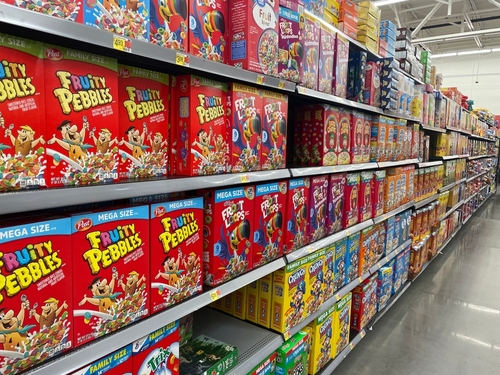Food giants are finally responding to years of health concerns by removing dangerous chemicals from our dinner tables. The movement, bolstered by the Trump administration and HHS Secretary Robert F. Kennedy Jr., could transform what Americans eat for breakfast, lunch, and dinner.
At a glance:
- General Mills pledges to remove artificial colors from its U.S. retail portfolio by 2027
- Kraft Heinz, Tyson Foods, and other major companies join the movement to eliminate synthetic dyes
- The FDA is revoking authorization for certain synthetic food colorings linked to health issues
- Critics point to harmful chemicals like chlormequat chloride in oat-based cereals as potential fertility risks
- The push comes amid pressure from the Trump administration and HHS Secretary Robert F. Kennedy Jr.
Major Food Companies Cleaning Up Their Act
General Mills just announced plans to eliminate artificial colors from its U.S. retail portfolio by the end of 2027, affecting about 15% of its products. This sweeping change will impact many American household favorites, including cereals served in K-12 schools, which will be dye-free by summer 2026.
The movement gained momentum after pressure from health advocates and the current administration, with HHS Secretary Robert F. Kennedy Jr. taking a strong stance against harmful food additives. Kraft Heinz quickly followed suit, becoming the second major food manufacturer this week to commit to removing synthetic dyes from its products.
Just months after @HHSgov and @US_FDA announced it will phase out petroleum-based synthetic dyes from the nation’s food supply, @KraftHeinzCo has committed to remove all artificial dyes from its foods by the end of 2027.
This voluntary step—phasing out harmful dyes in brands… pic.twitter.com/SxRNh76QJB
— Secretary Kennedy (@SecKennedy) June 17, 2025
Health Concerns Drive Changes
Critics have long argued that artificial dyes cause significant health problems, particularly hyperactivity in children, and may be contaminated with carcinogens. The FDA is now partnering with the National Institutes of Health to investigate the impact of these food additives on children’s health, signaling a serious concern about these chemicals.
Other major companies joining the movement include Tyson Foods, PepsiCo, Danone North America, TreeHouse Foods, and In-N-Out Burger. These corporations are not only removing artificial colors but also eliminating high-fructose corn syrup and other controversial ingredients from their product lines.
“Across the long arc of our history, General Mills has moved quickly to meet evolving consumer needs, and reformulating our product portfolio to remove certified colors is yet another example,” said Jeff Harmening, chairman and CEO of General Mills.
BREAKING: General Mills agrees to remove artificial dyes from its products following my investigation into the company for deceptively marketing its cereals that contain petroleum-based food colorings.
This is an incredible win for the health of our children and all Americans. pic.twitter.com/d2fZq0d2Gl
— Attorney General Ken Paxton (@KenPaxtonTX) June 18, 2025
This isn’t General Mills’ first attempt at removing artificial colors, though, having tried and reverted in 2016 due to consumer dissatisfaction with product appearance. The current commitment appears more definitive, with companies aligning with a voluntary 30-month timeline suggested by Health and Human Services.
Further Chemical Concerns Remain
While the removal of artificial dyes represents progress, critics point to other concerning chemicals still present in popular foods. Chlormequat chloride, found in oat-based cereals, has been linked to reproductive issues and other health problems in animal studies.
Secretary Robert F. Kennedy Jr. has specifically criticized chlormequat chloride, describing it as a “forever chemical” with potential serious health risks. A recent study suggested that this chemical may require further toxicity testing due to its potential impact on human health, particularly for children consuming these products regularly.
FDA Commissioner Marty Makary emphasized a preference for voluntary compliance but indicated the possibility of regulatory action if necessary. “I believe in love, and let’s start in a friendly way and see if we can do this without any statutory or regulatory changes, but we are exploring every tool in the toolbox to make sure this gets done very quickly,” Makary stated.
The FDA is already taking steps to revoke authorization for certain synthetic dyes and plans to eliminate others by the end of next year.
Click this link for the original source of this article.
Author: Editorial Team
This content is courtesy of, and owned and copyrighted by, https://www.conservativecardinal.com and its author. This content is made available by use of the public RSS feed offered by the host site and is used for educational purposes only. If you are the author or represent the host site and would like this content removed now and in the future, please contact USSANews.com using the email address in the Contact page found in the website menu.








